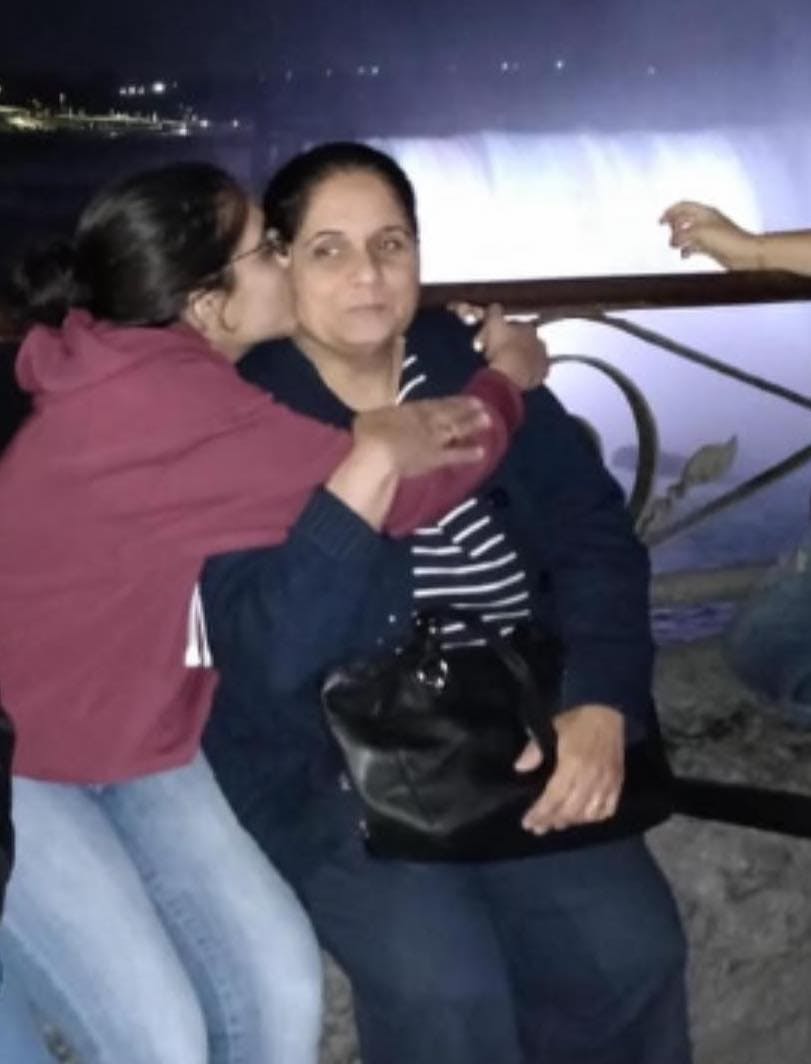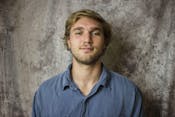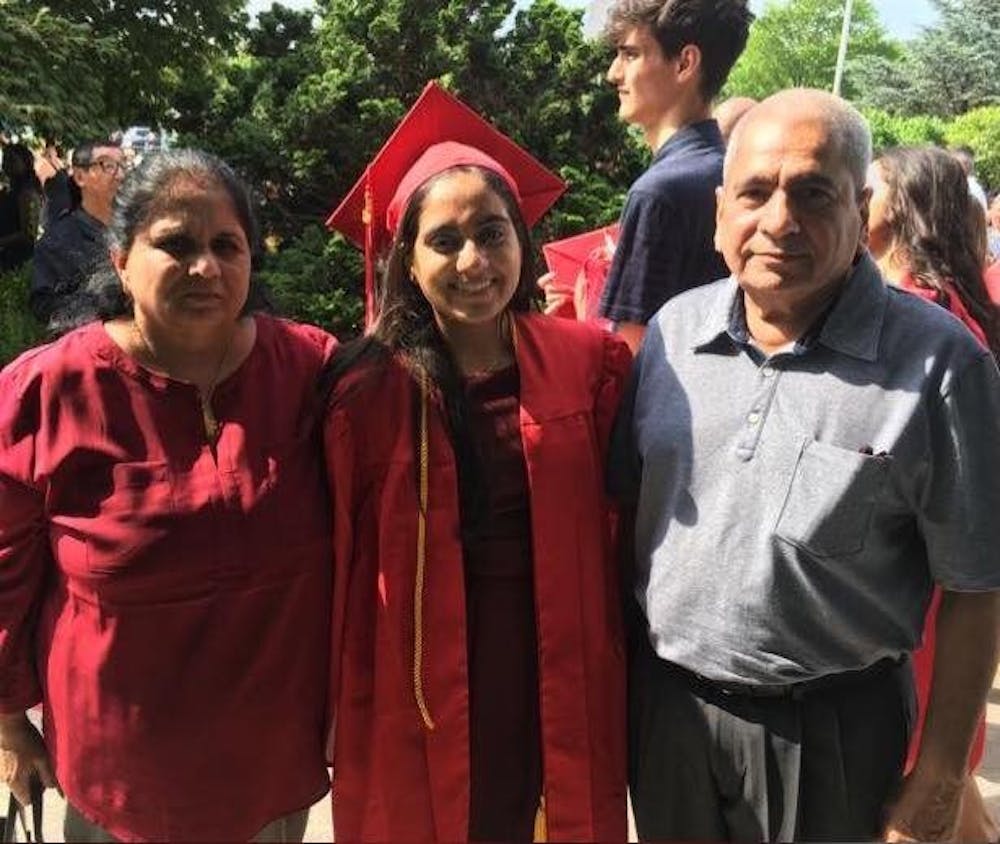Minnoli Aya never got to say goodbye to her mother, Madhvi.
Madhvi, the breadwinner of the family and “the person [Aya] would turn to when the world got ugly,” died alone in the hospital from COVID-19. She was 61.
The last time Aya saw or hugged her mother was in January, before she left home for the spring semester.
Aya and her family couldn’t see Madhvi in the hospital before she died because Aya’s father and grandmother both have heart conditions that put them at a higher risk if they contract the virus.
Aya communicated with her mom while she was in the hospital through text messages, but Madhvi’s responses became shorter and shorter. Then she stopped responding altogether.
The family could not even hug each other after Madhvi died for fear of contracting the virus. They kept six feet apart.
“I’m in a lot of pain [and] anger,” Aya said. “… I feel angry at the world. And a little at [my mother] for not coming home.”
She knows it’s not her mother’s fault.
She just misses her.
She’s also frustrated at the “broken” healthcare system that she believes played a role in her mother’s death. She thinks if her mother, a physician’s assistant, was advised to wear proper protective masks earlier, she might not have become ill.
A staff member at the Woodhull Medical Center where Madhvi worked told The New York Times that in early March, frontline employees weren’t instructed to wear protective masks when treating patients.
Some of those patients later tested positive for COVID-19.
Health officials now know the virus began circulating in the U.S. weeks before officials previously thought. Now, there are over 900,000 confirmed cases in the U.S. and almost 52,000 deaths. Of those numbers, at least 9,282 were health workers, according to a preliminary April 9 Centers for Disease Control and Prevention report. The true count, most experts agree, is certainly higher.
Aya never imagined her mother wouldn’t come home when she went to the hospital with a respiratory illness on March 18.
Aya drove home to Long Island on March 20 after UB announced it would begin “distance learning” for the rest of the semester and assumed her mother would be back at the house to meet her there soon. She thought her mother had pneumonia and that, since Madhvi was a medical worker, she would be “taken care of.”
Aya knew New York was rapidly becoming a hotspot, but she didn’t think her mom would be part of the statistics.
Each day, she got worse. Hospital workers tried to save her, but she died 11 days after she was admitted. She spent her last hours on a ventilator.
The week of Madhvi’s death, Woodhull, a public hospital in Brooklyn, had 20 COVID-19 patients on ventilators, Woodhull’s emergency department director Robert Chin told The New York Times. Thomas Soto, a radiology clerk who worked at Woodhull, also died of COVID-19.
Aya, a freshman biomedical sciences major and an only child, is devastated by the suddenness of her family’s loss. She said her mother was “the glue that held the family together” and described her as her “best friend, sister and mom wrapped into one.”
In addition to being a central figure in Aya’s family, Madhvi was also the breadwinner so the family is now facing financial hardships. Madhvi was the only family member with a steady income, so Aya’s family now depends on the generosity of neighbors and friends to pay for basic necessities. Aya and her father got their health insurance from Madhvi’s job, so they will lose their insurance at the end of the month.

Minnoli and Madhvi at Niagara Falls.
Aya says her mother’s death intensified her long-standing goal to become a cardiothoracic trauma surgeon. She wants to change the system so that frontline workers have more “protection.”
“I wanna make sure that when I’m a doctor, and when my friends are too, we don’t have to face days where we must sacrifice our safety and health without any protection,” Aya said. “I wanna make sure that, God forbid I have the same fate as my mother, my family at least will be taken care of when it comes to health insurance.”
Healthcare workers are on the frontlines of the pandemic and are at constant risk of exposure from infected patients and colleagues. Shortages of protective equipment, like facemasks, put them at high risk for infection. In China, over 3,000 medical workers –– primarily in the Wuhan region –– were infected. Healthcare workers were more likely than other groups to become infected during outbreaks of infectious disease in the past, like SARS and Ebola, according to The Washington Post.
Aya said she thinks it is unfair that frontline medical workers risk their lives, but people in medical system management positions tend to have more financial security.
“It’s not fair that CEOs of major corporations and hospitals make the salary they do but don’t do the life-saving work that doctors do,” Aya said. “... It’s not fair that my insurance has been taken away from me.”
Aya said “good” health insurance would cost her and her father over $1,200 every month. Without income, she said she is not sure that her family will be able to afford the insurance. That may mean that Aya won’t be able to afford the therapy sessions she wants to help cope with her mother’s death.
Until the month is over, Aya is still covered by her mother’s health insurance plan. She’s been able to talk remotely with a therapist, which she says is helpful.
But Aya said being isolated from her friends during the pandemic makes the grieving process particularly difficult, although she has been able to talk to her friends over the phone.
Thomas Shea, Aya’s friend and a freshman biomedical sciences major, said he wishes he could comfort Aya in person but said that he makes sure to “be there for her” remotely when she needs.
“I wanted to be there in person to give her a hug but couldn’t because of the circumstances,” Shea said. “I tried to comfort her, but I just knew nothing I could say could make it okay. I just always made sure to be there for her when she needed to vent or someone to let her know that she isn’t in this alone.”
Abigail Kolstee, Aya’s friend and peer biomedical sciences major, said that Aya talked to her about Madhvi’s death and her grieving process, but that her and Aya have been talking a lot about remote work for their classes.
“As of now it seems like [Aya] can handle it but she’s definitely stronger than most people I know,” Kolstee said. “Personally if I was in that position I don’t think I could keep up with my schoolwork, but she’s a lot stronger than me. She’s been able to handle it very well.”
Aya said her friends have been comforting to talk to, but her mother was the person she used to turn to. Aya fondly remembers late nights where her mother would stay awake talking to her until 1:30 in the morning, even though she had to work at the hospital at 4 a.m.
Aya said that becoming a doctor would make her feel “close” to her mother again. Madhvi, who was a doctor when she lived in India and a physician assistant since moving to the U.S., always talked to Aya about her dreams to become a doctor and encouraged them. Aya said she wants to “pay respect” to her mother’s “strength” and “bravery.”
“[Becoming a doctor] is probably the only way I’ll feel close to her again. … She dedicated her life to saving other people’s lives and I saw the strength and the bravery she had. You know, she was able to do it all. And I kind of wanted to pay respect to that and pay respect to my mother.”
Julian Roberts-Grmela is a senior news editor and can be reached at julian.grmela@ubspectrum.com and on Twitter @GrmelaJulian.

Julian Roberts-Grmela is a senior news editor for The Spectrum and an English and philosophy major. His favorite book is “White Teeth” by Zadie Smith and he hopes that one day his writing will be as good as hers.





